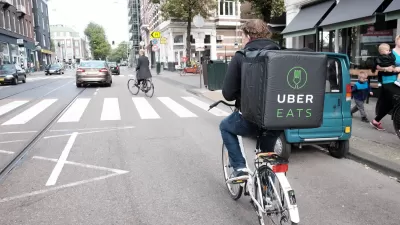Airbnb, arguably the most famous symbol of the sharing economy, has a court date with the New York State Attorney General in March. Meanwhile, a new report has evidence that Airbnb is fudging its numbers relevant to a key issue in the case.
According to Airbnb’s ongoing public relations efforts, many of the people who rent through the service aren’t running a business operation, but they also say its hard to quantify exactly how their users are profiting from the service—and that’s expected to be a central argument when New York examines the legality of Airbnb’s business model.
Jason Clampet, writing for a website called Skift and using the data crunching services of Connotate, however, has found evidence that “the vast majority of the platform's hosts in New York appear to be people who are absent from their apartments or the apartments that they manage when guests appear.”
Recently Airbinb told Skift that “87 percent of Airbnb hosts in New York share only the home in which they live.” But after crunching the numbers, Skift finds that “30% [of the platform’s rental inventory] comes from users who have posted more than one listing. This is made up of a mix of either one listing owned or leased by the person listing it and one other unit, or people who are renting multiple spaces on behalf of themselves or others.”
FULL STORY: Airbnb in NYC: The Real Numbers Behind the Sharing Story

Alabama: Trump Terminates Settlements for Black Communities Harmed By Raw Sewage
Trump deemed the landmark civil rights agreement “illegal DEI and environmental justice policy.”

Planetizen Federal Action Tracker
A weekly monitor of how Trump’s orders and actions are impacting planners and planning in America.

Why Should We Subsidize Public Transportation?
Many public transit agencies face financial stress due to rising costs, declining fare revenue, and declining subsidies. Transit advocates must provide a strong business case for increasing public transit funding.

Understanding Road Diets
An explainer from Momentum highlights the advantages of reducing vehicle lanes in favor of more bike, transit, and pedestrian infrastructure.

New California Law Regulates Warehouse Pollution
A new law tightens building and emissions regulations for large distribution warehouses to mitigate air pollution and traffic in surrounding communities.

Phoenix Announces Opening Date for Light Rail Extension
The South Central extension will connect South Phoenix to downtown and other major hubs starting on June 7.
Urban Design for Planners 1: Software Tools
This six-course series explores essential urban design concepts using open source software and equips planners with the tools they need to participate fully in the urban design process.
Planning for Universal Design
Learn the tools for implementing Universal Design in planning regulations.
Caltrans
Smith Gee Studio
Institute for Housing and Urban Development Studies (IHS)
City of Grandview
Harvard GSD Executive Education
Toledo-Lucas County Plan Commissions
Salt Lake City
NYU Wagner Graduate School of Public Service




























